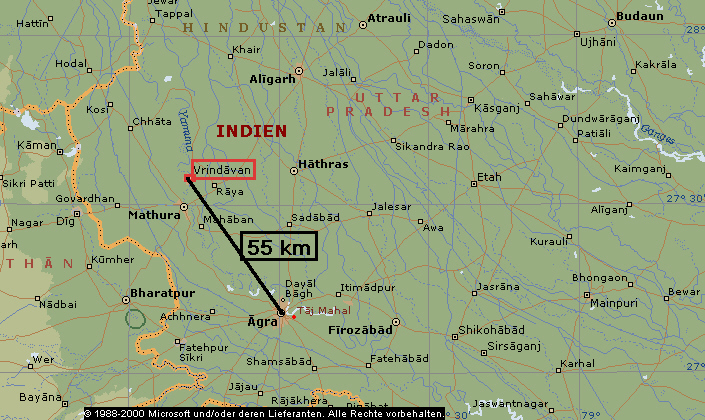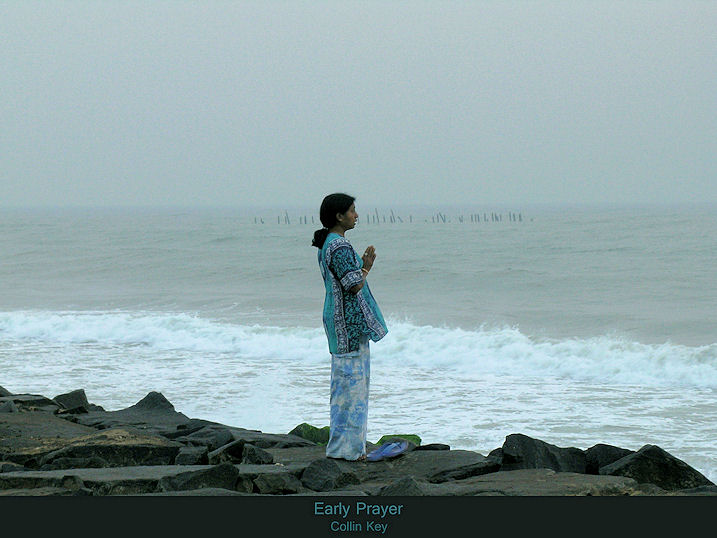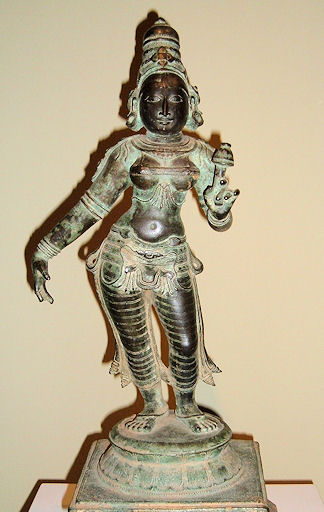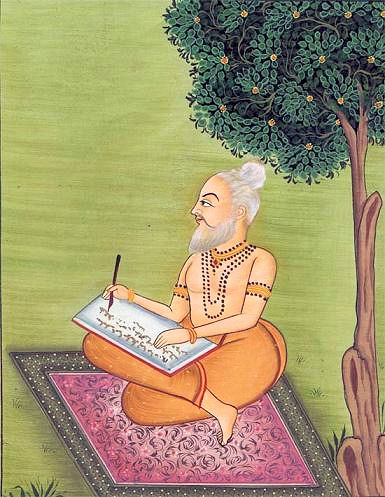

Mit den Auflösungen nach dem "Key" neu herausgegeben von Alois Payer
Zitierweise | cite as:
Apte, Vaman Shivaram <1858 - 1892>: The student's guide to Sanskrit Composition (Being a treatise on Sanskrit Syntax). -- 3. ed. -- 1890. -- 08. Lesson VIII. -- Fassung vom 2010-02-10. -- URL: http://www.payer.de/apte/apte08.htm
Ursprünglich erschienen als:
Apte, Vaman Shivaram <1858 - 1892>: The student's guide to Sanskrit composition : being a treatise on Sanskrit syntax ; for the use of schools and colleges. -- 3rd ed. -- Poona : R. A. Sagoon, 1890. -- 450 S.
A Key to Apte's Guide to Sanskrit composition : giving a close rendering into English and Sanskrit of all the Sanskrit and English sentences / compiled by an experienced graduate teacher. -- 2d ed. -- Bombay : Standard Pub., 1923. -- 136 p. ; 18 cm
Erstmals hier publiziert: 2010-02-10
Überarbeitungen:
©opyright: Public domain
Dieser Text ist Teil der Abteilung Sanskrit von Tüpfli's Global Village Library
Falls Sie die diakritischen Zeichen nicht dargestellt bekommen, installieren Sie eine Schrift mit Diakritika wie z.B. Tahoma.
Die Devanāgarī-Zeichen sind in Unicode kodiert. Sie benötigen also eine Unicode-Devanāgarī-Schrift.
Use of brackets:
<> = Apte`s own Notes (loc. cit. pp. 277ff.)
[] = A Key to Apte's Guide to Sanskrit composition : giving a close rendering into English and Sanskrit of all the Sanskrit and English sentences / compiled by an experienced graduate teacher. -- 2d ed. -- Bombay : Standard Pub., 1923. -- 136 p. ; 18 cm
{} = Notes by Alois Payer
§ 72. The chief sense of the Ablative case is अपादान. That from which separation, whether actual or conceived, takes place, is called अपादान and is put in the Ablative case; as, ग्रामादायाति 'he comes from a village'; i.e. that from which the separation takes place is ग्राम. It has thus the sense of 'from' in English.
§ 73.1 A noun in the Ablative case frequently denotes the cause of an action or phenomenon, and has the sense of 'on account of', 'for', 'by reason of' &c.; as, सौहृदादपृथगाश्रयां (Uttararāmacarita 1) 'not living apart (whose resort was not different) on account of affection.' A noun, not of the feminine gender, denoting the cause of an action, is put in the Instrumental or Ablative; as, जाड्येन जाद्यात् वा बद्धः (Siddhāntakaumudī) 'he was caught by reason of his dullness;' बुद्ध्या मुक्तः (Siddhāntakaumudī) 'he was set at liberty on account of his skill'; भक्त्या गुरौ मय्यनुकम्पया च प्रीतास्मि ते (Raghuvaṃśa II.63) 'I am pleased with thee for thy devotion to (thy) preceptor and compassion on me.'
1 विभाषा गुणे ऽस्त्रियाम् । (Pāṇini II.3.25) {'The fifth case-affix is employed optionally when the noun expresses an attribute, being the cause of an action, and not being of the feminine gender.' Transl. Vasu, 1891}
Obs. - Sometimes a feminine noun is also used in the Ablative in this sense ; as, नास्ति घटो ऽनुपलब्धेः (Siddhāntakaumudī) [There is no jar here, because it is not found (seen).]
(a) The Ablative often serves the purpose of a whole causative assertion in replying to, or advancing arguments in, discussions; as, पर्वतो वह्निमान् धूमात् (Tarka) 'the mountain has fire (in it) because there is smoke'; नेश्वरो जगतः कारणमुपपद्यते । कुतः । वैषम्यनैर्घृण्यप्रसंगात् (Śaṃkarabhāṣya) '(A disputant says), God cannot be efficient cause of the world. Why? (Because) he is liable to (the two charges of) being partial and cruel.' [Key: उपपद्यते - is reasonably proved or shown to be.]

Abb.: पर्वतो वह्निमान् धूमात्
[Source: limulus. --
http://www.flickr.com/photos/limulus/525958055/ . -- Zugriff am 2009-06-08.
-- Creative
Commons License (by, share alike)]
§ 74. Words in the comparative degree, or such as have the sense of comparision, are used with the Ablative of that with reference to which the comparison is made ; as सत्यादप्यनृतं श्रेयः (Veṇīsaṃhāra 3) 'falsehood is better even than truth'; मोहादभूत्कष्टतरः प्रबोधः (Raghuvaṃśa XIV.56) 'consciousness became more painful than swoon'; चैत्ररथादनूने वृन्दावने (Raghuvaṃśa VI.50) 'in Vṛndāvana not inferior to Caitraratha'; {चैत्ररथ = garden of Kubera, where he is waited upon by the Kinnaras.} अश्वमेधसहस्रेभ्यः सत्यमेवातिरिच्यते (Hitopadeśa 4) 'truth itself is superior to a thousand horse sacrifices'; श्र्āद्धस्य पूर्वाह्नादपराह्नो विशिष्यते (Manu III.278) 'for a Śrāddha ceremony afternoon is preferred to forenoon.'

Abb.: वृन्दावन
©MS Encarta
§ 75.1 When the sense of an absolutive is supressed in a sentence, the object of the absolutive is put in the Ablative case ; as, प्रासादट्प्रेक्षते (Siddhāntakaumudī) = प्रासादमारुह्य प्रेक्षते 'sees from a palace'; so श्वशुराज्जिह्रेति (Siddhāntakaumudī) = श्वशुरं वीक्ष्य जिह्रेति {he is ashamed of his father-in-law.}
1 ल्यब्लोपे कर्मण्युपसंख्यानम् । अधिकरणे च । प्रश्नाख्यानयोश्च । (Vārtika)
(a) The place where an action is performed is also put in the Ablative under the same circumstances ; as, आसनात्प्रेक्षते i.e. आसने उप्विश्य प्रेक्षते 'sees from a seat.'
(b) In questions and answers also the Ablative is used ; as, कुतो भवान् । पाटलिपुत्रात् (Mahābhāṣya) {Where are you from? From Pāṭaliputra.}
§ 76.1 Words denoting जुगुप्सा 'abhorrence', विराम 'cessation,' 'refraining', and प्रमाद 'swerving', govern the Ablative case ; as, पापाज्जुगुप्सते (Mahābhāṣya) 'he shrinks from sin' ; वत्सैतस्माद्विरम (Uttararāmacarita 1) 'desist from this, O child' ; स्वाधिकारात्प्रमत्तः (Meghadūta 1) 'swerving from his duty' ; similarly प्राणाघातान्निवृत्तिः (Nītiśataka 26) 'refraining from injuri to life' ; धर्मान्मुह्यति (Mahābhāṣya).
1 जुगुप्साविरामप्रमादार्थानामुपसंख्यानम् । (Vārtika)
Obs. प्रमद् is usually construed with the Lokative in the sense of 'to be careless about' ; as, न प्रमाद्यन्ति प्रमदासु विपश्चितः (Manu II.213) 'wise men are not careless about their women.'
§ 77.1 The teacher from whom something is learnt, the 'prime cause' in the case of जन् 'to be born', and the 'source' in the case of भू, are put in the Ablative case ; as, उपाध्यायादधीते (Siddhāntakaumudī) 'learns from the preceptor' ; so मया तीर्थादिभिनयविद्या शिक्षिता (Mālatīmādhava 1) 'I learnt the art of dramatic representation from a teacher' ; गोमयाद्वृश्चिको जायते (Mahābhāṣya) 'the scorpion is produced from cowdung' ; प्राणाद्वायुरजायत (Ṛgveda X.90) 'the wind was born from the breath' ; हिमवतो गंगा प्रभवति (Mahābhāṣya) 'the Ganges has its source in the Himālayas' ; लोभात्क्रोधः प्रभवति (Hitopadeśa 1) 'anger proceeds from avarice'.
1 आख्यातोपयोगे । जनिकर्तुः प्रकृतिः । भुवः प्रभवः । (Pāṇini I.4.29-31) {'29. The noun denoting the teacher is called Apādāna or ablation, in relation to the action signifying formal ´teaching. 30. The prime cause of the agent of the verb jan to be born, is called Apādāna. 31. The source of the agent of the verb bhū, to become, is called Apādāna.' Transl. Vasu, 1891}
Obs. Verbs meaning 'to be born' are often used with the Locative of the 'source' ; as, परदारेषु जायेते द्वौ सुतौ कुंडगोलकौ (Manu III.174) [Key: The two, born of anothers wife (by adultery) are Kuṇḍa and Golaka.] ; जातो ऽपि दास्यां शूद्रेण (Yājńavalkya II. 133) ; शुकनासस्यापि रेणुकायां तनयो जातः (Kādambarī 73) ; सा तस्यामुदपादि (Kumārasambhava I.22).
§ 78.1 In the case of words implying 'fear' and 'protection from danger,' that from which the fear or danger proceeds is put in the Ablative case ; as, न भीतो मरणादस्मि (Mṛcchakaṭika 10) 'I am not afraid of death' ; कपेरत्रासिषुर्नादात् (Bhaṭṭikāvya IX.11) 'were afraid of the monkey's sound' ; तीक्ष्णादुद्विजते (Mudrārākṣasa 3) 'is afraid of (shrinks away from) a severe person' ; भीमाद्दुःशासनं त्रातुं (Veṇisaṃhāra 3) 'to save Duḥśāsana from Bhīma' ; so लोकापवादाद्भयं (Nītiśataka 62) [Key: Fear of public censure.] ; तृणबिन्दोः परिशंकितः (Raghuvaṃśa VIII.79).
1 भीत्रार्थानां भयहेतुः । (Pāṇini I.4.25) {'In case of words implying 'fear' and 'protection from danger' that from which the danger or fear procedes is called Apādāna kāraka.' Transl. Vasu, 1891}

Abb.:
कपेरत्रासिषुर्नादात्, Agumbe (ಆಗುಂಬೆ),
Karnataka
[Source: wildxplorer. --
http://www.flickr.com/photos/krayker/2769652267/. -- Accessed 2009-06-09. --
Creative Commons
License (by, share alike)]
(a)1 That from which a person is warded off or prevented, is also put in the Ablative ; as, पापान्निवारयति (Nītiśataka 72) 'wards off from sin'.
1 वारणार्थानामीप्सितः । (Pāṇini I.4.27) {'In case of verbs having the sense of 'preventing,' the desired object from which one is prevented or warded off is called Ablation or Apādāna kāraka.' Transl. Vasu, 1891}
§ 79.1 In the case of the root जि with परा, that which becomes unbearable is put in the Ablative case ; as अध्ययनात्पराजयते (Mahābhāṣya) 'finds study unbearable'.
1 पराजेरसोढः । (Pāṇini I.4.26) {'In the case of the verb parāji, 'to be tired or weary of,' that which becomes unbearable, is called Apādāna kāraka.' Transl. Vasu, 1891}
§ 80.1 The point of time or space from which some 'distance or time or space' is measured, is put in the Ablative case. The word denoting the 'distance in space' is put either in the Nominative or Locative, and that denoting the 'distance in time', in the Locative ; as, गवीभुमतः सांकाश्यं चत्वारि योजनानि चतुर्षु योजनेषु वा (Mahābhāṣya) "Śāṃkāśya is four yojanas from Gavībhuma' ; कार्तिक्या आग्रहायणी मासे (Mahābhāṣya) 'Āgrahāyaṇi is one month (at the interval of one month) from Kārtikī.' So समुद्रात्पुरी क्रोशौ or क्रोशयोः. {1 क्रोश ~ 3-4 km}
1 यतश्चाध्वकालनिर्माणं तत्र पञ्चमी । तद्युक्तादध्वनः प्रथमासप्तम्यौ । कालात्सप्तमी च वक्तवा । (Vārtika)

Abb.: समुद्रात्पुरी
क्रोशौ क्रोशयोर्वा
पुरी = ପୁରୀ
©MS Encarta
§ 81.1 Words meaning 'other than' or 'different from', such as अन्य, पर, इतर ; आरात् 'near' or 'remote' ; ऋते 'without' ; words indicative of the 'directions' used also with reference to the 'time' corresponding to them ; words expressive of 'directions' derived from the root अञ्च् (e.g. प्राक्, प्रत्यक्) ; and such as end in आ and आहि ; all these govern the Ablative case ; as, कृष्णादन्यो भिन्न इतरो वा (Siddhāntakaumudī) 'different from, or other than, Kṛṣṇa' ; आराद्वनात् (Siddhāntakaumudī) 'near the forest, or away from it' ; विविक्तादृते ऽन्यच्छरणं नास्ति (Vikramorvaśīya 2) 'there is no resort other than a retired spot' ; ग्रामात्पूर्व उत्तरो वा 'to the east or north of the village' ; चैत्रात्पूर्वः फाल्गुनः (Siddhāntakaumudī) 'the month of Phālguna is prior to that of Caitra' ; प्राक् प्रत्यग्वा ग्रामात् (Siddhāntakaumudī) 'to the east or west of the village' ; दक्षिणा दक्षिणाहि वा ग्रामात् (Siddhāntakaumudī) 'to the south, or in the southern direction, of the village' ; प्राङ्नाभिवर्धनात् (Manu II.29) 'before the navel is cut.'
1 अन्यारादितरर्तेदिक्शब्दाञ्चूत्तरपदाजाहियुक्ते । (Pāṇini II.3.29) {'When a noun is joined with words meaning 'other than' or with ārāt 'near or remote' or itara 'different from' or ṛte 'without,' or words indicative of the 'directions' (used also with reference to the time corresponding to them) or with words having ańcu 'to bend' as the last member of the compound and expressive of direction, or with words ending with the affix āc or āhi (V.3.36 and 37) the fifth case case-affix is employed.' Transl. Vasu, 1891}
§ 82. The words प्रभृति, आरभ्य, बहिः, अनन्तरं, परं and ऊर्ध्वं govern this case ; as, शैशवात्प्रभृति पोषितां (Uttararāmacarita 1) 'brought up ever since her childhood' ; मालत्याः प्रथमावलोकदिवसादारभ्य (Mālatīmādhava 6) 'from the day of first seeing Mālatī' ; निवसन्नावसथे पुराद्बहिः (Raghuvaṃśa VIII.14) 'residing in a dwelling out of the town' ; पाणिपीडनविधेरनन्तरं (Kumārasaṃbhava VIII.1) 'after the espousing of her hand' ; अमात्परं (Śakuntalā 6) 'after this person' ; ऊर्ध्वं म्रिये मुहूर्ताद्धि (Bhaṭṭikāvya XVIII.36) 'I shall die after a moment.'
Obs. - (a) The words प्रभृति and आरभ्य are often found used with adverbs of time in the same sense ; as, यतः प्रभृति, ततः प्रभृति (Śakuntalā 3) ; अद्य प्रभृति तवास्मि दासः (Kumārasambhava V. 86).
(b) The sense of अनन्तरं, परं &c. is sometimes understood ; as, बहोर्दृष्टं कालात् (Uttararāmacarita 2) 'seen after a long time.'
§ 83.1 The words पृथक् 'different', विना and नाना, govern, besides this case, the Accusative and Instrumental cases ; as, रामाद्रामेण रामं वा विना पृथग् नाना वा (Siddhāntakaumudī) 'without or different from Rāma' ; नाना नारीं निष्फला लोकयात्रा (Vopadeva) [Key: Without a woman, worldly life is useless.]
1 पृथग्विनानानाभिस्तृतीयान्यतरस्याम् । (Pāṇini II.3.32) {'When joined with the words pṛthak 'without,' vinā 'without,' and nāna 'without' the third case-affix is employed, optionally (as well as the fifth and the second).' Transl. Vasu, 1891}
§ 84. The preposition आ in the sense of 'till', 'as far as', and 'from' governs the Ablative case ; as, आ परितोषाद्विदु्षां (Śakuntalā 1) 'till the satisfaction of the learned' ; आ मूलाच्छ्रोतुमिच्छामि (Śakuntalā 1) ' I wish to hear from the beginning' ; आ कैलासात् (Meghadūta 11) 'as far as the Kailāsa'. Sometimes आ is joined to nouns to form Avyayībhāva compounds ; as, आमेखलं संचरतां घनानां (Kumārasambhava I.5) 'of clouds sweeping as far as the girdle (middle part).'

Abb.:
आ कैलासात्
[Source: Ondřej ˇvįček / Wikipedia:
GNU FDLicense]
§ 85.1 When 'concealment' is indicated, the person whose sight one wishes to avoid is put in the Ablative case ; as, मातुर्निलीयते कृष्णः (Siddhāntakaumudī) 'Kṛṣṇa hides himself from his mother.'
1 अन्तर्धौ येनादर्शनमिच्छति । (Pāṇini I.4.28) {'When concealment is indicated, the person whose sight one wishes to avoid, is called Apādāna kāraka.' Transl. Vasu, 1891}
§ 86.1 The preposition प्रति in the sense of 'representative of' or 'in exchange for', governs the Ablative ; as, प्रद्युम्नः कृष्णात्प्रति (Siddhāntakaumudī) 'Pradyumna is the representative of Kṛṣṇa' ; तिलेभ्यः प्रतियच्छति माषान् (Siddhāntakaumudī) 'exchanges Māṣas for sesamum.' {माष = Vigna radiata (L.) R. Wilczek = Mung bean}
1 प्रतिनिधिप्रतिदाने च यस्मात् । (Pāṇini II.3.11) {'The 5th case-affix (Ablative) is employed after whatsoever is governed by a karmapravacanīya in the sense of 'substitute' or 'exchange' (I.4.22).' Transl. Vasu, 1891}

Abb.: माष = Vigna radiata
(L.) R. Wilczek = Mung bean
[Source: Sarefo / Wikipedia. GNU FDLIcense]
अनुष्ठितनिदेशो ऽपि सत्क्रियाविशेषादनुपयुक्तमिवात्मानं समर्थये ॥१॥ (Śakuntalā 7)
<Notes: सत्क्रियाविशेषात् 'on account of the distinguished reception' (on the part of Indra) ; the king means to say that he has done nothing to merit such a grand reception at Indra's hands.>
[Key: अनुष्ठितो निदेशो येन सः । सक्रियाया विशेषस्तस्मात् । न उपयुक्तः अनुपयुक्तः ।
Although I have executed his (Indra's) command, yet, on account of the extraordinary reception (given to me), I consider myself as having been of no use to him.]
अलमलमाक्रन्दितेन । सूर्योपस्थानात्प्रतिनिवृत्तं पुरूरवसं मामुपेत्य कथ्यतां कुतो भवत्यः परित्रातव्या इति ॥२॥ (Vikramorvaśīya 1)
<Notes: सूर्योपस्थानात् प्रतिनिवृत्तं 'returned after having served, or waited upon, the sun.'>
[Key: Away, away with crying. Come to mu, Purūravas, who have just returned from having paid my rspects to (or waited on) the sun, and tell me from whom your ladyships are to be protected.]

Abb.: सूर्योपस्थानम्, Puducherry (புதுச்சேரி)
[Source: Collin Key. --
http://www.flickr.com/photos/collin_key/3385643346/ . -- Accessed
2009-06-10. --
Creative
commons license (by, no commercial use, share alike)
रामः -- एवमेतत् । एते हि हृदयमर्मभिदः संसारभावा येभ्यो बीभत्समानाः सम्त्यज्य सर्वान्कामान्मनीषिणो ऽरण्ये विश्राम्यन्ति ॥३॥ (Uttararāmacarita 1)
[Key: ह्र्दयस्य मर्माणि हृदयमर्माणि । हृदयमर्माणि भिन्दन्तीति ह्र्दयमर्मभिदः ।
Rāma - Thus it is. These are the worldly incidents that cut the vital parts of the heart, disgusted with which wise men, leaving off all desires, find rest in the forest.]
नास्ति जीवितादन्यदभिमततरमिह जगति सर्वजंतूनाम् ॥४॥ (Kādambarī 35)
[Key: There is nothing dearer to creatures in this world than life.]
नैव जानासि तं देवमैक्ष्वाकं यदेवं वदसि । तद्विरम्यतामतिप्रसंगात् ॥५॥ (Uttararāmacarita 5)
[Key. You certainly do not know the king of the Ikṣvāku race, since you talk so (speak about him in this way). Desist then from transgressing the proper bounds (from this impertinence).]
कृतातिथ्यया महाश्वेतया परिपृष्टो दिग्विजयादारभ्य किंनरमिथुनानुसरणप्रसंगेनाअगमनमात्मनः स्रवमाचचक्षे ॥६॥ (Kādambarī 134)
[Key: कृतमातिथ्यं यया तया । दिशां विजयः दिग्विजयः तस्मात् । किन्नरयोर्मिथुनं किन्नरमिथुनं तस्यानुसरणं तस्य प्रसंगेन ।
Asked by Mahāśvetā who had received him hospitably, he told her everything, beginning from his conquest of the quarters and his arrival there on account of his pursuit of the pair of the Kinnaras.]
वत्से मालति जन्मनः प्रभृति वल्लभा ते लवंगिका । तत्किमुज्जिहानजीवितां वराकीं नानुकम्पसे ॥७॥ (Mālatīmādhava 10)
<Notes: उज्जिहानजीवितां 'whose life is departing', or leaving her.>
[Key: उज्जिहानं (pre. p. of हा to go) जीवितं यस्याः ।
Dear Mālatī, from the time of your birth Lavāṅgikā has been thy dear friend. Why doest thou not take pity on the poor girl whose life is about to pass away?]
चाणक्यः -- वृषल वृषल अलमुत्तरोत्तरेण । यद्यमत्तो वरीयान् राक्षसो ऽवगम्यते तदिदं शस्त्रं तस्मै दीयताम् ॥८॥ (Mudrārākṣasa 3)K
<Notes: उत्तरोत्तरं 'more following more,' 'talking more and more.'>
[Key: Cāṇakya -- Vṛṣala, O Vṛṣala, have done with the bandying of words (altercation). If you think Rākṣasa is superior to me, give this (ministerial) sword to him (have him for your minister).]
तासां चतुर्दश कुलानि । एकं भगवतः कमलयोनेर्मनसः समुत्पन्नम् । अन्यद्वेदेभ्यः संभूतम् । अन्यदग्ररुद्भूतम् । अन्यत्प्वनात्प्रसूतम् । अन्यदमृतादुन्मथ्यमानादुत्थितम् । अन्यज्जलाज्जातम् । अन्यदर्ककिरणेभ्यो निर्गतम् । अन्यत्सौदामनीतः प्रवृत्तम् ॥९॥ (Kādambarī 136)
<Notes: तासां = अप्सरसां.>
[Key: तासां &c. may be easily translated. कमलं योनिर्यस्य - Sprung from the lotus (issuing from Viṣṇu's navel), Brahman. - सौदामनी - Lightning.]
मां
तावदुद्धर शुचो दयिताप्रवृत्त्या
स्वार्थात्सतां गुरुतरा प्रणयिक्रियैव ॥१०॥ (Vikramorvaśīya 4)
<Notes: Said by Purūravas to the Swan. तावत् 'first,' 'before doing anything else.' "To the good the business of a suupplicant is more weighty (important) than their own interest.'>
[Key: दयितायाः प्रवृत्तिः दयिताप्रवृत्तिः तया । प्रणयिनः (of a petitioner) क्रिया प्रणयिक्रिया ।
In the first place rescue me from sorrow by giving me some intelligence about my beloved; complying with the request of a supplicant is weightier (more important) in the eyes of good than their own business.]
निशम्य
चैनां तपसे कृतोद्यमाम् सुतां गिरीशप्रतिसक्तमानसाम् ।
उवाच मेना परिरभ्य वक्षसा निवारयन्ती महतो मुनिव्रतात् ॥११॥ (Kumārasaṃbhava V.3)
<Notes: तपसे कृतोद्यमां 'who had made up her mind to practise penance.' मुनिव्रतं = तपश्चरणरूपं>
[Key: गिरेः ईशः गिरीशः Śiva ; गिरीशे प्रतिसक्तं मानसं यस्याः ताम् । Construe - मेना गिरीशप्रतिसक्तमानसां सुतां तपसे कृतोद्यमां निशम्य एनां वक्षसा परिरभ्य महतो मुनिव्रतात् निवारयन्ती उवाच ।
Hearing that her daughter, who had set her heart on the Lord of Kailāśa (Śiva), was preparing for penances, Menā (her mother) pressing her to her bosom (embracing her) said, dissuading her from the great (difficult) vow of asceticism.]
प्रजां
संरक्षति नृपः सा वर्धयति पार्थिवम् ।
वर्धनाद्रक्षणं श्रेयस्तदभावे सदप्यसत् ॥१२॥ (Hitopadeśa 3)
<Notes: तदभावे &c. -- 'In its absence (there being no protection) even that which exists becomes non-existing.' i.e. there is no security of person or property.>
[Key: A king protects his subjects and they contribute to his prosperity; but protection is better than contribution (to power); for in its absence what is is not (i.e. see Notes); or सद् what is good (beneficial, to one's advantage) is bad (is not so).]
त्वचं
स मेध्यां परिधाय रौरवीम्
अशिक्षतास्त्रं पितुरेव मन्त्रवत् ॥१३॥ (Raghuvaṃśa III.31)
<Notes: सः = रघुः । अस्त्रं 'the science of missiles.' His father himself was his guru.>
[Key: रौरवी ... रुरोः इयं of Ruru (a kind of deer).
Having put on the holy skin of the Ruru deer he learnt the use of weapons with their proper incantations from his father; his father was not only king upon earth but he was the one archer (bow-wielder) as well.]
{रुरु = Boselaphus tragocamelus = Nilgai
Abb.: रुरु = Boselaphus tragocamelus = Nilgai
[Source: CooKeeN / Wikipedia. -- GNU FDLIcense]
अनम्राणां समुद्धर्तुस्तस्मात्सिन्धुरयादिव ।
आत्मा संरक्षितः सुह्मैर्वृत्तिमाश्रित्य वैतसीम् ॥१४॥ (Raghuvamśa IV.35)
<Notes: तस्मात् 'from the conqueror, Raghu.' आत्मा संरक्षितः 'the Suhmas saved themselves.' वैतसीं वृत्तिमाश्रित्य 'following the course of reeds,' which bend down to the current water; hence 'yielding to a stronger enemy.'>
[Key: From him, the uprooter of unyielding, as from the tide of a river, their selves were saved by Suhmas by adopting the course of the action of the cane-plant (which bends as the current sweeps over it).]
ध्यायतो विषयान्पुंसः संगस्तेषूपजायते ।
संगात्संजायते कामः कामात्क्रोधो ऽभिजायते
॥
क्रोधाद्भवति संमोहः संमोहात्स्मृतिविभ्रमः ।
स्मृतिभ्रंशाद्बुद्धिनाशो बुद्धिनाशात्प्रणश्यति ॥१५॥ (Bhagavadgītā VI. 62-63)
[Key: As a man broods over objects of senses he gets attached to them ; attachment begets Kāma (desire for them) which produces restlessness (क्रोध) ; restlessness gives rise to stupefaction which leads to loss of memory ; loss of memory results in loss of senses (discrimination) and from loss of discrimination one suffers ruin.]
हिमवद्विन्ध्ययोर्मध्यं यत्प्राग्विनशनादपि ।
प्रत्यगेव प्रयागाच्च मध्यदेशः प्रकीर्तितः ॥१६॥ (Manu II.21)
<Notes: describe the position of 'Madhyadeśa.'>
[Key: That which lies between Himālaya and Vindhya and which is to the east of Vinaśana and to the west of Prayāga, is called the middle country.]
{
Abb.: विन्ध्य
[Source: Nichalp / Wikipedia. -- GNU FDLicense]विनशन: "the disappearing" = where river Sarasvatī seeps away, maybe near हनुमानगढ़ in राजस्थान.
प्रयाग = "place for offering" today Allahābād (Hindi: इलाहाबाद, Urdu: الہ آباد Ilāhābād) in Uttar Pradesh (उत्तर प्रदेश, اتر پردیش)}
जन्मकर्मतो मलिनतरजनम् जनतो निस्त्रिंशतरलोकहृदयं लोकहृदयेभ्यो निर्घृणतरसर्वसंव्यवहारमपुण्यकर्मैकापणं पक्कणमपश्यम् ॥१॥ (Kādambarī 356)
[Notes: जन्मकर्मतो मलिनतरजनं 'the people in which were dirtier than their birth and deeds.' निर्घृणतर etc. 'all whose practises were more aboinable than their hearts.']
<Key: जनम च कर्म च तस्मात् ; अतिशयेन निस्त्रिंशं निस्त्रिंशतरं, निस्त्रिंशतराणि लोकानां हृदयानि यस्मिन् । न्र्घृणतराः सर्वे संव्यवहारा यस्मिन् । न पुण्यानि अपुण्यानि अपुण्यानि च तानि कर्माणि तेषामेक आपण्स्तम्.
I saw the habitation of Cāṇḍālas wherein the people were dirtier than their birth and actions (signified), in which the hearts of men were more cruel than the people themselves, in which all the transactions were more heart-rending than the hearts of the people and which are the sole market-place for foul (sinful) deeds.>
सा कुसुमघटितशिलीमुखमनोहरान्मदनचापादिव प्रमदवनात्त्रस्यति जानकीव पीतरक्तेभ्यो रजनिचरेभ्य इव चम्पकाशोकेभ्यो बिभेति ॥२॥ (Kādambarī 225)
[Notes: She considers the pleasure-garden to be the bow of Cupid, which is lovely on account of having arrows made of flowers, and the garden is also lovely on account of bees clinging to the flowers. शिलीमुख 'arrow', and 'bee'. पीतरक्ताः - पीताश्च ते रक्ताश्च, Campaka and Aśoka being yellow and red respectively; and पीतं रक्तं यैस्र्ते when taken with रजनिचर.]
<Key: कुसुम° goes with मदनचाप and प्रमदवन. सा कुसुमेषु घटिताः शिलीमुखा भ्रमराः तैः मनोहरं तस्मात्प्रमदवनात् बिभेति ; कुसुमैः घटिताः शिलीमुखा बाणाः तैर्मनोहरं तस्मात् कुसुमचापादिव । जानकी पीतं रक्तं (blood) यैः तेभ्यः रजनिचरेभ्य इव पीता रक्ताश्च ये चम्पका अशोकाश्च तेभ्यः &c.
She (Kādambarī) shrinks from (going to) the Pramadavana (female garden) attractive on account of the bees perching on flowers as if it were the bow of Madana charming on account of its arrows being formed of flowers ; or (which deprives one of consciousness and the arrows of which &c.); she is afraid of the Campaka and Aśoka trees which are (respectively) yellow and red, like Jānakī who was afraid of the demons that had drunk blood.]
{चम्पक m. Michelia champaka L. = Magnolia champaka (L.) Baillon ex Pierre = Champaka, Joy Parfümbaum
चम्पक n. = flower of Michelia champaka L.
Abb.: चम्पक = Michelia champaka L.
[Source: Denis Conrado / Wikipedia. -- GNU FDLicense]अशोक m. = Ashoka-tree = Saraca asoca (Roxb.) Wilde
Abb.: Ashoka-tree = Saraca asoca (Roxb.) Wilde
Kolkata = কলকাতা
[Source: J.M.Garg / Wikipedia. GNU FDLicense]जानकी (daughter of जनक) = सीता}
तं नृपं वसुरक्षितो नाम मन्त्रिवृद्ध एकदाभाषत । तात अत्रभवति सर्वैवात्मसंपदभ्जनात्प्रभृत्यन्यूनैव लक्ष्यते । वृद्धिश्च निसर्गपट्वी तवेतेरेभ्यः प्रतिविशिष्यते ॥३॥ (Daśakumāracarita II.8)
<Notes: आत्मसंपद् 'self-excellence.' अभिजनात्प्रभृति 'beginnig with noble descent.'>
[Key: An old minister (or a minister who was old among the ministers), by name Vasurakṣita, said to the King, "Dear Prince, all the excellence of the soul, beginning with noble birth, appear to be not at all wanting in you. And your talent, naturally sharp, surpasses that of others."]
अहो दुराराध्या राजलक्ष्नीरात्मविद्भिरपि राजभिः -
तीक्ष्नादुद्विजते मृदौ परिभवत्रासान्न संतिष्टते
मूर्खान्द्वेष्टि न गच्छति प्रणयितामत्यन्तविवत्स्वपि ।
शूरेभ्यो
ऽप्यधिकं
बिभेत्युपहसत्येकान्तभीरूनहो
श्रिरलब्धप्रसरेव वेशवनिता दुःखोपचर्या भृशम् ॥४॥ (Mudrārākṣasa 3)
<Notes: Oh, the goddess of wealth is difficult to be propitiated (managed), even by kings who know their selves (i.e. their duty). Another reading for आत्मविद्भिः is आत्मवद्भिः where वत् shows excellence, even by excellent (knowing diplomacy) kings.
लब्धप्रसरा 'who has got room for free or unhampered conduct,' 'grown ascendant.' दुःखोपचर्या 'served or propitiated with difficulty.'>
[Key: परिभवात् त्रासः प्रैभवत्रासः तस्मात् । एकान्तं भीरवः एकान्तभीरवः तान् । लब्धः प्रसरो यया । वेशस्य वनिता वेशवनिता ।
She shrinks with fright from one who is rigorous and does not bide with one who is mild for fear of an outrage; she hates fools and feels no affection even for those who are profoundly learned; she feels shy all the more of the valiant and laughs at those who are exceedingly timid: like a courtesan that has gained ascendancy (lit. has got room for action), Śrī is very much difficult to wait upon (to please).]

Abb.: श्री = लक्ष्मी
Sculpture of a bronze Sri Devi (17th century) from the
Vijayanagar period on display at the Iris & B. Gerald Cantor Center for Visual
Arts on the Stanford University campus in Stanford, California.
[Source: BrokenSphere / Wikimedia Commons. -- GNU FDLicense]
सर्वद्रव्येषु विद्यैव
द्रव्यमाहुरनुत्तमम् ।
अहार्यत्वादनर्घत्वादक्षयत्वाच्च सर्वदा ॥५॥ (Hitopadeśa
1)
<Key: नास्ति उत्तमं यस्मात् । Of all things (the wise) say learning is the best ; because it is incapable of being taken away, or valued or wasted away.>
प्रजानां विनयाधानाद्रक्षणाद्भरणादपि ।
स पिता पितरस्तासां केवलं जन्महेतवः ॥६॥ (Raghuvaṃśa I.24)
[Notes: विनयाधानं 'imparting moral training,' 'teaching good manners.']
<Key: विनयस्याधानं तस्मात् । On account of his imparting education to his subjects, his protecting them and bringing them up, he was a father to them; their parents were simply the causes of their birth.]
न नवः प्रभुराफलोदयात्स्थिरकर्मा विरराम कर्मनः ।
न च योगविधेर्नवेतरः स्थिरधीरा परमात्मदर्शनात् ॥७॥ (Raghuvamśa VIII.22)
[Notes: नवः = अजः ; नवेतरः = रघुः. 'He, of firm resolve, did not desist from his practice of meditation till he had seen the Supremje Being.']
{The Raghu-lineage:
Dilīpa - दिलीप
Raghu - रघु
Aja - अज
Daśaratha - दशरथ
Rāma - राम}
<Key: स्थिराणि कर्माणि यस्य सः । योगस्य विधिः योगविधिः । नवादितरः ० नवेतरः । स्थिरा धीर्यस्य सः । परमश्चासौ आत्मा परमात्मा तस्य दर्शनात् ।
The new king, firm of pupose (steadily carrying out his plans) did not desist from action until it bore fruit; nor did the one other than the new (the old king) of firm mind desist from the practice of contemplation until he obtaines a vision of the Supreme Soul.>
रत्नैर्महार्हैस्तुतुषुर्न देवा न भेजिरे भीमविषेण
भीतिम् ।
सुधां विना न प्रययुर्विरामं न निश्चितार्थाद्विरमन्ति धीराः ॥८॥ (Nītiśataka 80)
<Key: The gods were not satisfied with the jewels of great value nor were they deterred at the sight of the terrible poison; they ceased not their efforts until they obtained nectar. The wise (or steadyminded) stop not short of their desired object.>
श्रेयान्स्वधर्मो विगुणः परधर्मात्स्वनुष्ठितात् ।
स्वधर्मे निधनं श्रेयः प्रधर्मो भयावहः ॥९॥ (Bhagavadgītā III.35)
[Notes: स्वनुष्ठित 'well observed.']
<Key: विगता गुणा यस्य । सुष्ठु अनुष्ठितः स्वनुष्ठितह् । भयमावहतीति भयावहः ।
The proper duties prescribed for one's own class though defective are better than those of others though well performed. Death in (performing) ones own duties is preferable; the performance of the duties of others is dangerous.>
लोभान्मोहाद्भयान्मैत्र्यात्कामात्क्रोधात्तथैव च ।
अज्ञानाद्बालभावाच्च् साक्ष्यं वितथमुच्यते ॥१०॥ (Manu VIII.118)
[Key: The evidence tendered by a witness is said to be false (not trustworthy), (when proceeding) from greed (i.e. when the man is known to be covetous) or infatuation or fear or friendship or desire, or anger, as well as from ignorance or childhood.]
पूर्वस्मादन्यवद्भाति भावाद्दाशरथिं स्तुवन् ।
ऋते क्रौर्यात्समायातो मां विश्वासयितुं तु किम् ॥
इतरो रावणादेष राघवानुचरो यदि ।
सफलानि निमित्तानि प्राक्प्रभातात्ततो मम ॥११॥ (Bhaṭṭikāvya VIII.105-6)
<Notes: Said by Sītā, when she found Māruti near her in the Aśoka garden. पूर्वस्मात् &c. 'he appears to be different from the former (i.e. Rāvaṇa), since he devoutly glorifies Rāma; or is it that he has come here to inspire confidence in me, without any cruelty?' प्रभातात् प्राक् scil. दृष्टानि स्वप्नदर्शनादीनि शुभनिमित्तानि.>
{Māruti = Hanumān
Abb.: मारुति / हनुमान्
Chola Dynasty, 11th Century
[Source: PHGCOM / Wikipedia. -- GNU FDLicense]}[Key: पुर्वस्तात् &c. - See Notes. ऋते क्रौर्यात् - Setting aside his cruelty (i.e. having assumed a gentle form).
If he is other than Rāvaṇa and a follower of Rāghava, then the auspicious omens observed before day-break have borne fruit.]
{Rāghava = Rāma}
वृक्षाद्वृक्षं प्रक्रामन्रावणाद्बिभ्यतीं भृशम् ।
शत्रोस्त्राणमपश्यन्तीमद्र्श्यो जनकात्मजाम् ॥
तां पराजयमानां स प्रीते रक्ष्यां दशाननात् ।
अन्तर्दधानां रक्षेभ्यो मलिनां ध्याममूर्धजाम् ॥ (अपश्यत्) ॥१२॥
(Bhaṭṭikāvya VIII.70-1)
<Notes: सः = मारुतिः ; तां = सीतां. प्रीतेः पराजयमानां ' who found (Rāvaṇa's) adresses to be unbearable.'>
[Key: Construe. - स मारुतिः अदृश्यः सन् वृक्साद्वृक्षं परिक्रामन् रावणात् भृशं बिभ्यतीं जनकात्मजामपश्यत् ।
He, jumping from tree to tree without being observed, saw the daughter of Janaka, who was mightily afraid of Rāvaṇa, who did not know how to protect herself from her enemy, who turned back with disgust from the love of the demon, who deserved protection from Rāvaṇa, who hid herself from the Rākṣasas and whose hair was dirty (not being combed and dressed).]
{daughter of Janaka = Sītā}
एतद्वो
ऽयं भृगुः शास्त्रं श्रावयिष्यत्यशेषतः ।
एतद्धि मत्तो ऽधिजगे सर्वमेषो ऽखिलं मुनिः ॥१३॥ (Manu I.59)
[Key: This Bhṛgu will impart to you (lit. will make you hear) this Śāstra fully (lit. without leaving out anything) ; the sage has learnt the whole from me.]
एकाक्षरं परं ब्रह्म प्राणायामः परं तपः ।
सावित्र्यास्तु परं नास्ति मौनात्मात्सत्यं विशिष्यते ॥१४॥ (Manu II.83)
<Notes: एकाक्षरं 'the one syllable' ॐ. सावित्र्यास्तु परं नास्ति 'there is nothing superior to Sāvitṛ,' the celebrated Gāyatrī Mantra (which has to be silently repeated or muttered).>
[Key: The one syllable (Om) is the highest Brahma; practising Prāṇāyāma (the inhaling, through one nostril the other being closed up, retaining and then exhaling through the other, of the breath) is the highest form of asceticism; there is nothing superior to Sāvitrī; truthfulness is superior to the vow of practising silence.]
All translations from the Key.
1. A house without a house-wife surpasses forest in dreariness.
ग्र्हिणीं or गेहिनीं विना गृहं शून्यतया कान्तारादतिरिच्यते ॥१॥
2. Go in the northern direction (उत्तरं) of this tree, and I shall just follow you.
गच्छ त्वं तस्माद्वृक्षादुत्तरमहमहमप्यनुपदमागत एव ॥२॥
3. Do not desist from the work you have once promised to perform.
एकदा कार्यत्वेनाङ्गीकृतात् - अध्यवसितात्कार्यान्मा विरम ॥३॥
4. I have walked to this place from the hermitage of Vālmīki to learn the Vedas from these ascetics.
एभ्य ऋषिभ्यो वेदानध्येतुं or निगमविद्यामधिगन्तुं वाल्मीक्याश्रमादिह पर्यटामि । इदं स्थानमुपगतास्मि ॥४॥

Abb.: वाल्मीकिः
[Source: Vastu / Wikipedia. -- Public domain]
5. He exposed himself to much trouble in saving that girl from danger.
संकटात् or जीवितसंशयात्तां कुमारीं रक्षता or उद्धरता तेनात्मा महति क्लेशे पातितः or क्लेशस्य पदमुपनीतः or पात्रं कृतः ॥५॥
6. He who wards off his friend's mind from sin and makes him set it on virtue, is called a real friend.
य आत्मनो मित्रस्य मनः पापान्निवारयति - परावर्तयति धर्मे or पुण्यकर्मणि नियोजयति च स एव परमार्थतो मित्रं or सुहृदुच्यते ॥६॥
7. Do you know what various kinds of miseries result from treading in the foot-steps of the wicked?
दुरात्मनां पदस्यानुसरणात् विविधा or नानाविधा or अनेकप्रकारा आपदः or अनर्थाः - उद्भवन्तीति न जानासि किम् ॥७॥
8. This your illness arose (जन्) from your great exertions of yesterday. Is there now any change for the better?
अयं तव व्याधिस्तव ह्यस्तनान्महतः परिश्रमात् or आयासाज्जातः । अस्त्यधुना को ऽपि विशेषः ॥८॥
9. Who else but this powerful king can protect his realm as far as (आ) the regions of the Himālayas?
अस्माद्बलवतः or बाहुशालिनः - नृपात्को ऽन्य आ हिमालयप्रदेशेभ्य आत्मनो राज्यं रक्षितुं समर्थः ॥९॥
10. Before (प्राक्) beginning his studies he places his grammar and dictionary by him.
अध्ययनस्यारम्भात्प्राक्स व्याकरणं कोशं च सन्निधौ स्थापयति ॥१०॥
11. Five years ago I saw this very charming forest; but now it has undergone a vast change.
पञ्चवर्षात्प्राक् or पञ्चेभ्यो वर्सेभ्यः प्रागहमिदमतिरमणीयं वनमपश्यम् । किन्त्वधुना तद्तीव विपर्यस्तं or विपर्यासं यातम् ॥११॥
12. Ever since the day on which I happened to see her, my mind has become perturbed, and I do not think even of taking my food, on account of my constantly thinking of her.
यस्मिन्दिवसे तामहं यदृच्छयाद्राक्षं or सा मे दर्शनपथं or नयनविषयं याता तस्माद्दिनादारभ्य मम मनः पर्याकुलं जातं or परिप्लवतां यातं तस्याश्चाविरतचिन्तनेनाहारसेवने अन्नग्रहणे ऽपि न मतिं करोमि or मतिर्जायते
13. I do not approve the speech you made yesterday after (ऊर्ध्वं or अनन्तरं) the excellent oration of the President.
अध्यक्षस्य प्रकृष्टात् or प्रशस्तात् or उत्तमगुणात् वाक्यप्रपञ्चादूर्ध्वं ह्यस्त्वय कृतं भाषणं नाभिनन्दामि ॥१३॥
14. Sītā was dearer to Rāma (gen.) than his very life.
Dearer - प्रेयसी
15. Honesty is superior to all other virtues; without it one cannot inspire any one with confidence.
सुचिता, दाक्षिण्यं सर्वेभ्य इतरेभ्यो गुणेभ्यः प्रतिविशिष्यते । यतस्तया or तेन विना न को ऽपि कस्मिंश्चिदपि विश्वासं - प्रत्ययं - जनयेत् or उत्पादयेत् ॥१५॥
16. That wretched fowler did not see the little parrot on account of his body being contracted through fear.
भयसम्पिण्डिताङ्गत्वात् or भयसंकुचितगात्रत्वात्स व्यधहतकस्तं शुकशिशुं नापश्यत् or अलक्षयत् ॥१६॥

Abb.: शुकं नालक्षयत्
Vernal Hanging-Parrot - Loriculus vernalis,
Thattekad Bird Sanctuary (ഡോ. സാലിം അലി പക്ഷിസങ്കേതം,
തട്ടേക്കാട്), Kerala (കേരളം)
[Source: Lip Kee. --
http://www.flickr.com/photos/lipkee/1556638363/. -- Downloaded on
2010-02-10. --
Creative commons license (attribution, share alike)
17. Revered Sir, we wish to hear from you the history of this parrot from (आ) the beginning.
भगवन् त्वत्त आमूलादस्य शुकस्य कथां श्रोतुमिच्छामः ॥१७॥
18. Bombay is one hundred and twenty miles from Poona.
मुम्बापुरी ओऊन्यओअत्तनात्षष्टिः क्रोशाः or पञ्चदश योजनानि (or Loc.) ॥१८॥
To Lesson IX